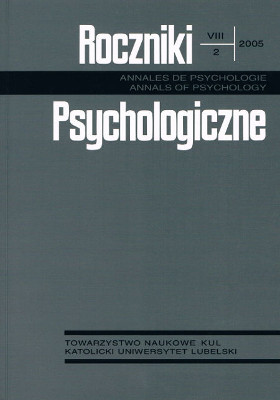Predicators of proenvironmental consumer choices
Abstract
This paper deals with the problem of the predictors of purchasing proenvironmental products. The research sample consisted of 109 people at different age from general population. It was assumed that higher level of ecological awareness, stronger feeling of ecological responsibility and stronger general responsibility influence proenvironmental consumer choices. Analysis of the results reveals that consumers that think they have great control over their consumer behaviours, possess stronger feeling of general responsibility, feel shared responsibility for the present condition of the environment and have stronger beliefs about mutual connections with the nature are more willing to buy ecological products. However, the influence of demographic variables (age, sex, education) on choices of ecological products was not found.
References
Ajzen, I. (1991). The theory of planned behavior. Organisational Behavior and Human Decision Processes, 50, 179-211.
Boldero, J. (1995). The prediction of household recycling of newspapers: The role of attitudes, intentions, and situational factors. Journal of Applied Social Psychology, 25, 440-462.
Burger, T. (1992). Świadomość ekologiczna: między lękiem a działaniem. Raport InE, nr 1. Warszawa: Instytut na rzecz Ekorozwoju.
Burger, T. (1994). Świadomość ekologiczna. W: Świadomość społeczna: Niderlandy ekologiczne. Raport InE, nr 1. Warszawa: Instytut na rzecz Ekorozwoju.
Burger, T. (1997). Optymizm i lokalność. Społeczna świadomość ekologiczna ’97. W: Agenda niespełnionych nadziei. Raport InE, nr 4. Warszawa: Instytut na Rzecz Ekorozwoju.
Burger, T. (1999). Konflikt i współdziałanie. Świadomość ekologiczna i postawy społeczeństwa. W: W. Mirowski (red.), Świadomość ekologiczna i społeczne ruchy „zielonych” w Polsce (s. 35-56). Warszawa: Instytut Filozofii i Socjologii Polskiej Akademii Nauk.
Burger, T., Sadowski, A. (1994). Świadomość społeczna: Niderlandy ekologiczne. Warszawa: Raport Instytutu na Rzecz Ekorozwoju.
CBOS (1992). Środowisko i sprawy publiczne. Raport z badań.
Cook, A. J., Kerr, G. N., Moore, K. (2002). Attitudes and intentions towards purchasing GM food. Journal of Economic Psychology, 23, 557-572.
Dahab, D. J., Gentry, J. W., Su, W. (1995). New ways to reach non-recyclers: An extension of the model of reasoned action to recycling behaviors. Advances in Consumer Research, 22, 251-256.
Falkowski, A., Tyszka, T. (2001). Psychologia zachowań konsumenckich. Gdańsk: Gdańskie Wydawnictwo Psychologiczne.
Gajewski, S. (1997). Zachowanie się konsumenta a współczesny marketing. Łódź: Wydawnictwo Uniwersytetu Łódzkiego.
Gliński, P. (1996). Polscy Zieloni. Ruch społeczny w okresie przemian. Warszawa: Instytut Filozofii i Socjologii PAN.
Goldenhar, L. M., Connell, C. M. (1993). Understanding and predicting recycling behavior: An application of the theory of reasoned action. Journal of Environmental Systems, 22, 91-103.
Kaiser, F. G., Ranney, M., Hartig, T., Bowler, P. A. (1999). Ecological behavior, environmental attitude, and feelings of responsibility for the environment. European Psychologist, 4, 59-74.
Kaiser, F. G., Scheuthle, H. (2002). Two challenges to a moral extension of the theory of planned behavior: Moral norms and just world beliefs in conservationism. Personality and Individual Differences, 33, 1033-1048.
Kaiser, F. G., Shimoda, T. A. (1999). Responsibility as a predictor of ecological behavior. Journal of Environmental Psychology, 19, 243-253.
Kaiser, F. G., Wölfing, S., Fuhrer, U. (1999). Environmental attitude and ecological behaviour. Journal of Environmental Psychology, 19, 1-19.
Kiełczowski, D. (2001). Ekologia społeczna. Białystok: Wydawnictwo Ekonomia i Środowisko.
Magnusson, M. K., Areola, A., Koivisto Hursti, U. K., Åberg, L., Sjödén, P. O. (2001). Attitudes towards organic food among Swedish consumers. British Food Journal, 103, 209-227.
Mirowski, W. (1999). Świadomość ekologiczna współczesnego społeczeństwa polskiego w świetle badań naukowych. W: W. Mirowski (red.), Świadomość ekologiczna i społeczne ruchy „zielonych” w Polsce (s. 9-34). Warszawa: Instytut Filozofii i Socjologii PAN.
Oskami, S., Harrington, M. J., Edwards, T. C., Sherwood, D. L., Okuda, S. M., Swanson, D. C. (1991). Factors influencing household recycling behavior. Environment and Behavior, 23, 494-519.
Stern, P. C., Dietz, T., Kalof, L. (1993). Value orientations, gender, and environmental concern. Environment and Behavior, 25, 322-348.
Taylor, S., Todd, P. (1995). An integrated model of waste management behavior: A test of household recycling and composting intentions. Environment and Behavior, 27, 603- 630.
Van Liere, K. D., Dunlap, R. E. (1981). Environmental concern: Does it make a difference how it’s measured? Environment and Behavior, 13, 651-676.
Wiśniewski, A. (red.) (1995). Świadomość ekologiczna konsumentów polskich. Warszawa: Konsumencki Instytut Jakości.
Wyka, A., Gliński, P. (1992). Świadomość ekologiczna społeczeństwa polskiego. Komunikat z badań OBOP. Warszawa.
Copyright (c) 2005 Roczniki Psychologiczne

This work is licensed under a Creative Commons Attribution-NonCommercial-NoDerivatives 4.0 International License.


